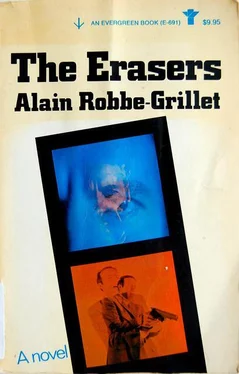Alain Robbe-Grillet - The Erasers
Здесь есть возможность читать онлайн «Alain Robbe-Grillet - The Erasers» весь текст электронной книги совершенно бесплатно (целиком полную версию без сокращений). В некоторых случаях можно слушать аудио, скачать через торрент в формате fb2 и присутствует краткое содержание. Жанр: Криминальный детектив, на английском языке. Описание произведения, (предисловие) а так же отзывы посетителей доступны на портале библиотеки ЛибКат.
- Название:The Erasers
- Автор:
- Жанр:
- Год:неизвестен
- ISBN:нет данных
- Рейтинг книги:4 / 5. Голосов: 1
-
Избранное:Добавить в избранное
- Отзывы:
-
Ваша оценка:
- 80
- 1
- 2
- 3
- 4
- 5
The Erasers: краткое содержание, описание и аннотация
Предлагаем к чтению аннотацию, описание, краткое содержание или предисловие (зависит от того, что написал сам автор книги «The Erasers»). Если вы не нашли необходимую информацию о книге — напишите в комментариях, мы постараемся отыскать её.
The Erasers — читать онлайн бесплатно полную книгу (весь текст) целиком
Ниже представлен текст книги, разбитый по страницам. Система сохранения места последней прочитанной страницы, позволяет с удобством читать онлайн бесплатно книгу «The Erasers», без необходимости каждый раз заново искать на чём Вы остановились. Поставьте закладку, и сможете в любой момент перейти на страницу, на которой закончили чтение.
Интервал:
Закладка:
This time Laurent raises his arms to the ceiling. This was all he needed!
“What kind of joke is that?”
“Don’t shout, Commissioner. Do I look like I’m joking?”
He doesn’t certainly. Laurent drops his hands on the desk.
“Tonight,” Marchat continues, “I’m supposed to go to a certain place where the murderers will be waiting for me-the ones who shot Dupont yesterday-and then it’ll be my turn…”
He climbs the stairs-slowly.
This house has always looked sinister to him. The ceilings that are too high, the dark woodwork, the corners harboring shadows which the electric light never manages to dispel-everything seems to reinforce the anxiety that has seized him since he came in.
Tonight, Marchat notices details that had never struck him before: creaking doors, disturbing hallways, inexplicable shadows. At the end of the banister grimaces a jester’s head.
From step to step the ascent grows slower. In front of the little painting of the blasted tower, the condemned man stops. He would like to know, now, what this painting means.
In a minute it will be too late-for there are only five more steps before he reaches the place where he will die.
His interlocutor’s lugubrious tone does not impress the commissioner. He asks for details: who is to kill Marchat? Where? Why? And how does he know? Besides, Doctor Juard hasn’t made any reference to his presence in the clinic; why not? Laurent has difficulty concealing his thoughts; he is almost convinced he is dealing with a lunatic who may not even have known the professor and in whom the mere delusion of persecution may have inspired notions so senseless. If he weren’t apprehensive about this lunatic’s possible violence, Laurent would show him the door at once.
However, Marchat speaks vehemently. What he has to say is extremely serious. There are unfortunately certain things which he cannot reveal, but he begs the commissioner’s help: he can’t let an innocent man be killed in this way! Laurent grows impatient:
“How do you expect me to help you if you can’t tell me anything?”
Marchat finally tells how he happened to be in front of Juard’s clinic in the Rue de Corinthe just when the doctor was bringing in a wounded man. He came closer out of curiosity and recognized Daniel Dupont, whom he had met, in other circumstances, at the home of mutual friends. He offered his services to help carry him, for the doctor was alone. If the latter has not mentioned his intervention, it is by Marchat’s express request: the latter was particularly anxious that his name not be connected with this crime in any way. Nevertheless the turn events are taking obliges him to put himself under police protection.
Laurent is astonished: would Doctor Juard have accepted the help of a passer-by, when he had specialized personnel at his disposal?
“No, Commissioner, there was no one there at that hour.”
“There wasn’t? What time was it?”
Marchat hesitates a few second before answering:
“It must have been around eight-eight-thirty; I couldn’t say exactly.”
It was at nine that Juard telephoned the police to announce Dupont’s death. Laurent asks:
“Wasn’t it probably after nine?”
“No, it wasn’t: by nine poor Dupont was already dead.”
So Marchat has been to the operating room. The doctor declared he needed no assistant for the operation, whose extreme seriousness had, in fact, not yet become apparent to him. Yet Dupont, fearing the worst, has taken advantage of the few minutes he had before he was put under the anesthetic to reveal the circumstances of the attack. Marchat must have promised not to divulge them, though he doesn’t understand why secrecy must be kept with regard to the police. In any case, he doesn’t think he’s breaking his word by revealing to the chief commissioner the task the professor has entrusted him with-though nothing, he repeats, would indicate himself as a candidate for such an adventure. He is supposed to go this very day to the little house in the Rue des Arpenteurs and take certain files which he will then hand over to a prominent political figure to whom these papers are of the greatest importance.
There are two things Laurent doesn’t understand. Why, first of all, must this operation be kept secret? (Is it on account of the heirs?) And on the other hand, what is so dangerous about it? As for the “circumstances of the attack,” Marchat can rest easy: it is easy to reconstitute them!
In adding this, the commissioner-who still suspects suicide-winks meaningfully at his interlocutor. He is no longer sure what to make of this Marchat: according to the details the latter is furnishing about his friend’s death, one must admit that he certainly was at the clinic last evening; yet the rest of his remarks are so irrational and confused that it seems difficult to dismiss the hypothesis of madness, even so.
Emboldened by what he interprets as signs of complicity, the businessman is now speaking-ambiguously-of the terrorist organization and its opposition to a political group that…of which…Laurent, who finally sees what the other man is trying to say, helps him out of his difficulty:
“A political group whose members have systematically been assassinated, one by one, every evening at seven-thirty.”
And Marchat, who has not noticed the ironic smile which has accompanied this sentence, seems enormously relieved by it.
“Aha,” he says, “I suspected you knew all about it. That simplifies things a lot. Keeping the police in ignorance of the truth, as Dupont wanted to do, could only have unfortunate consequences. No matter how often I repeated my conviction to him that it was precisely the police’s business-and not mine!-there was no way of making him give up his ridiculous mystery. That’s why I started by playing this farce; and since you answered me in the same tone, we have had some difficulty putting a stop to it. Now we’ll be able to talk.”
Laurent decides to take him up on it. He is rather curious to see what will come out of all this.
“You were saying that Daniel Dupont, before dying, had given you a secret mission which endangered your life?”
Marchat opens his eyes wide. “Before dying?” He no longer knows what he can say and what he must conceal.
“Well,” Laurent insists, “what makes you think that someone’s lying in wait for you in that house?”
“The doctor, Commissioner! Doctor Juard! He heard everything!”
Doctor Juard was present when Dupont explained the importance of the files in question and what must be done with them. Once he understood that Marchat was to go for them, he slipped away on some pretext or other and telephoned the leader of the gang to warn him. Marchat had taken the precaution of repeating loudly that he didn’t belong to the group, but he noticed that the doctor had not believed a word he said; so that the gangsters have decided to make the businessman their victim this very evening. And the police simply must stop them, for it is a mistake, a tragic mistake: he has never had any relation with the group, he isn’t even an advocate of their policy, and he doesn’t want…”
“All right,” Laurent says, “calm down. Did you hear what the doctor said on the telephone?”
“No…I mean: not exactly, but…Just from the look on his face, it was easy to see what he was going to do.”
Obviously this man is every bit as mad as Roy-Dauzet. But what is the source of this collective hysteria? As for Dupont, it is understandable that he has found it convenient to accuse the mysterious anarchists: he would have been wiser to have sent his papers off before killing himself. Still other points are not extremely clear. Unfortunately, there is not much hope of having them explained by questioning this man.
Читать дальшеИнтервал:
Закладка:
Похожие книги на «The Erasers»
Представляем Вашему вниманию похожие книги на «The Erasers» списком для выбора. Мы отобрали схожую по названию и смыслу литературу в надежде предоставить читателям больше вариантов отыскать новые, интересные, ещё непрочитанные произведения.
Обсуждение, отзывы о книге «The Erasers» и просто собственные мнения читателей. Оставьте ваши комментарии, напишите, что Вы думаете о произведении, его смысле или главных героях. Укажите что конкретно понравилось, а что нет, и почему Вы так считаете.












